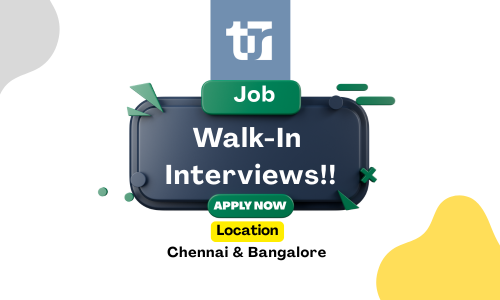Walk-In Interviews: Engineering Jobs in Chennai & Bangalore Nov at TR India offers a significant career opportunity for skilled professionals in the Engineering, Procurement, and Construction (EPC) sector. TR India, a vital part of the global EPC leader Técnicas Reunidas, is hosting a walk-in drive to recruit experienced engineers and designers for its offices in Chennai and Bangalore. This event targets candidates with specific expertise to contribute to large-scale, international projects in sectors like refining, petrochemicals, and energy transition.
The Company: TR India (Técnicas Reunidas Engineers India Private Limited)
Walk-In Interviews: Engineering Jobs in Chennai & Bangalore Nov at TR India are an invitation to join one of the world’s foremost engineering and construction companies. Técnicas Reunidas, S.A. (TRSA) is a Spanish-based general contractor providing end-to-end services for industrial and power generation plants.
Company Profile and History
Técnicas Reunidas has a history dating back to 1959. The company specializes in the design, engineering, procurement, and construction (EPC) of complex industrial facilities. With over 60 years of experience, TRSA has successfully delivered more than 1,000 industrial plants in over 50 countries globally. TRSA is a public company based in Madrid, Spain.
TR India Operations
Tecnicas Reunidas Engineers India Private Limited, or TR India, was incorporated in 2011. It serves as one of TRSA’s key global engineering centers, alongside Spain, Abu Dhabi, and Turkey.
- Registration: Incorporated on October 17, 2011, and registered with the ROC Bangalore.
- Location: The registered address is in Bangalore, Karnataka. TR India operates engineering centers in both Chennai and Bangalore.
- Focus: TR India provides high-quality engineering and design services for the group’s global projects, playing a critical role in project execution.

Core Business Sectors
TRSA’s business is structured around major industrial and energy sectors:
- Oil and Gas: Design and construction of refining units, petrochemical facilities, and natural gas processing plants.
- Power Generation: Projects related to thermal, combined cycle, and renewable power generation.
- Energy Transition: Focus on sustainable solutions, including low-carbon hydrogen (Blue and Green), Carbon Capture and Storage (CCS), and bioenergy projects.
- Infrastructure: Specialized projects in areas like metallurgy and environmental engineering.
Walk-In Interview Details
The Walk-In Interviews: Engineering Jobs in Chennai & Bangalore Nov at TR India event offers a direct recruitment path for experienced professionals.
Key Event Information
| Detail | Description |
| Event Focus | Engineering Professionals for EPC Projects |
| Locations | Chennai and Bangalore Offices (Specific venue details will be in the official announcement) |
| Date | 8th November 2025 (Tentative, based on similar past events) |
| Time | 9:00 AM – 3:00 PM IST (Typical timings) |
| Encouraged Candidates | Immediate joiners and candidates with relevant EPC experience. |
How to Attend the Interview
Candidates must follow a clear process for the Walk-In Interviews: Engineering Jobs in Chennai & Bangalore Nov at TR India.
- Pre-Screening (Highly Recommended): Send your updated Curriculum Vitae (CV) for pre-screening to the company’s designated email address for India applicants.
- Email Subject Structure: NAME, POSITION, and YEARS OF EXPERIENCE.
- Document Preparation: Bring a clear copy of your latest updated CV and a recent ID photograph to the venue.
- Walk-In: Attend the interview at the specified date, time, and location. Pre-validated candidates generally receive priority.
Job Positions and Experience Requirements
The Walk-In Interviews: Engineering Jobs in Chennai & Bangalore Nov at TR India targets various engineering disciplines. Experience in the EPC environment, particularly in refining, oil & gas, or petrochemical sectors, is essential.
Process Engineering
Process Engineers design the procedures and equipment necessary to transform raw materials into final products efficiently and safely.
- Job Position: Process Engineer, Senior Process Engineer, Lead Process Engineer
- Experience: 5 to 20+ Years
- Key Responsibilities:
- Perform process simulations and develop process flow diagrams (PFDs).
- Create Piping and Instrumentation Diagrams (P&IDs).
- Calculate heat and mass balances.
- Prepare equipment data sheets and specifications.
- Perform sizing of process equipment like vessels, pumps, and heat exchangers.
Piping Stress Engineering
Piping Stress Engineers ensure the structural integrity of piping systems under various operating and environmental loads.
- Job Position: Piping Stress Engineer, Lead Piping Stress Engineer
- Experience: 8 to 15+ Years
- Key Responsibilities:
- Perform static and dynamic stress analysis for critical lines using software like CAESAR II.
- Develop critical line lists and stress analysis reports.
- Specify, select, and locate pipe supports, including spring hangers and snubbers.
- Review and approve piping general arrangement (GA) drawings and equipment nozzles.
Electrical Engineering
Electrical Engineers design the power generation, distribution, and control systems for industrial plants.
- Job Position: Electrical Engineer, Electrical Design Engineer, Electrical Control System Engineer
- Experience: 5 to 20+ Years
- Key Responsibilities:
- Perform power system studies, including load flow, short circuit, and motor starting analysis, using tools like ETAP.
- Design and specify electrical equipment, including transformers, switchgear, and motor control centers (MCCs).
- Prepare cable sizing, lighting layouts, and grounding specifications.
- Develop protection schemes and relay settings.

Other Potential Engineering Disciplines
The specific roles available in the Walk-In Interviews: Engineering Jobs in Chennai & Bangalore Nov at TR India may include:
- Mechanical (Rotating & Static Equipment): Engineers specializing in machinery like compressors, turbines, vessels, and heat exchangers.
- Instrumentation & Control: Professionals dealing with system automation, control valves, field instruments, and Distributed Control Systems (DCS).
- Civil & Structural: Engineers for plant structures, foundations, and civil works.
- Designers (SP3D/E3D): Specialists in 3D modeling and drafting across piping, electrical, and structural disciplines.
Get instant updates about premium job alerts: 👉 Click to Join WhatsApp Group
Top 10 Interview Questions and Answers
Candidates attending the Walk-In Interviews: Engineering Jobs in Chennai & Bangalore Nov at TR India must prepare technical answers. The following questions cover common areas for EPC engineering roles.
1. Question: What is a P&ID, and how does it differ from a PFD?
Answer: A P&ID (Piping and Instrumentation Diagram) shows the detailed piping, equipment, instruments, and control logic for a process unit. It defines all parts of the process. A PFD (Process Flow Diagram) shows the main process flow, major equipment, and primary streams. The P&ID contains much more detail than the PFD.
3. Question: What is the primary purpose of piping stress analysis?
Answer: The primary purpose of piping stress analysis is to ensure the integrity of the piping system and connected equipment. It verifies that system stresses (thermal, pressure, weight) remain below allowable code limits. It also confirms that equipment nozzle loads meet vendor specifications.
4. Question: What is the Stress Intensification Factor (SIF) in piping analysis?
Answer: SIF is a multiplier applied to the calculated stress at a component (like a branch connection or elbow). It accounts for the localized stress increase caused by geometric discontinuity, meaning the component experiences higher stress than a straight pipe under the same load.
5. Question: Describe the components of a typical switchgear.
Answer: A typical switchgear comprises several essential components. These include: circuit breakers for fault protection, disconnect switches for isolation, fuses, busbars for power distribution, protective relays for fault detection, and instrumentation for measurement.
6. Question: How do you determine the size of a motor control center (MCC)?
Answer: Engineers determine MCC size based on the total electrical load and the number of motors and other loads it needs to control. The design must account for total current capacity, short-circuit rating, physical space requirements, and future expansion needs.
7. Question: What is the main difference between an isolation valve and a control valve?
Answer: An isolation valve, such as a gate or ball valve, is primarily used for stopping or starting flow to isolate equipment for maintenance. It operates fully open or fully closed. A control valve is used for continuously adjusting flow rate, pressure, or temperature in response to a control signal.
8. Question: Explain the term ‘HAZOP’ in an EPC project.
Answer: HAZOP stands for Hazard and Operability Study. It is a structured and systematic examination of a process plant design. A multidisciplinary team uses guide words (e.g., No Flow, High Pressure) to identify potential hazards and operability problems, ensuring safety and functionality.
9. Question: How do you ensure correct material selection for a specific process line?
Answer: Correct material selection involves considering several factors: fluid corrosivity, operating temperature and pressure, fluid velocity, and mechanical strength requirements. The engineer follows material selection guidelines, codes (like ASME B31.3), and project specifications to choose the most suitable and cost-effective material.
10. Question: What is the significance of the “Tie-In” point in a brownfield project?
Answer: A tie-in point is the physical junction where new plant construction connects to an existing operating facility (brownfield project). This point is critical because it requires careful planning, risk assessment, and precise execution to ensure minimal disruption and safe shutdown/startup of the existing plant.
Career Growth and Work Culture at TR India
Joining the Walk-In Interviews: Engineering Jobs in Chennai & Bangalore Nov at TR India means aligning your career with a global industry leader.
Professional Development
TR India places a strong emphasis on continuous growth. The company provides personalized training plans to enhance technical expertise. Engineers gain exposure to diverse, dynamic international projects across various geographies. This continuous professional development ensures employees remain at the forefront of engineering technology.
Global Project Exposure
TRSA executes projects worldwide. TR India engineers contribute to significant global projects in key energy and industrial markets. This exposure offers invaluable experience in working with international teams, meeting stringent global quality standards, and applying best-in-class technologies.
Work Environment
The work culture fosters a diverse and multicultural environment. TR India prioritizes a responsible and ethical management approach. The company promotes work-life balance and labor flexibility, aiming to create a supportive and thriving workplace.
Sobmit Your Application Here


